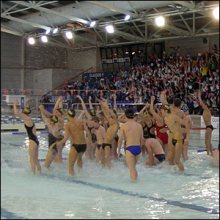Concern deepens over cost of Commonwealth Pool revamp
From the Edinburgh Evening News:
Concern deepens over cost of Commonwealth Pool revamp
By Alan Roden
THE cost of a major refurbishment of the Royal Commonwealth Pool is set to soar above its £37 million estimate, officials have warned.
It is feared the project carries a major risk of "unexpected defects and problems that will be uncovered" as the scheme progresses, due to the complex nature of the A-listed building. Inflation in the building industry is also running high.Delays – caused partly by uncertainty over the future of Meadowbank Stadium – have led to costs rising by around £185,000 a month. The council has agreed to proceed with the pool revamp as a "priority", but part of the Meadowbank site is still likely to be sold to fill a £10.5m funding gap.The pool scheme involves a major overhaul, but is deemed more urgent than Meadowbank because Edinburgh is due to host the 2014 Commonwealth Games diving competition on Glasgow's behalf.
Council leaders said it would "take time" to redevelop the city's sports facilities following years of "under-investment" by Labour.But opposition councillors today claimed the administration was to blame.
Labour's culture and leisure spokesman, Paul Godzik, said: "The inability of this administration to show some leadership and take big decisions clearly has a cost. Financially, costs are rising daily due to the continual delay in getting these projects started, yet there could also be a cost in terms of the quality of sports facilities."While the Royal Commonwealth Pool project will go ahead, it is clear that the administration is looking to cut back on other facilities, and will not deliver the ambitious plans which were outlined by Labour that would have taken the city's sporting facilities into the 21st century." His Tory counterpart, Gordon Buchan, urged the administration to return to the original plans for a complete sell-off of Meadowbank, which would fund both the pool revamp and a new replacement sports facility at Sighthill.
"We won't know what we're facing until we start opening up the Royal Commonwealth Pool building," he said. "Construction inflation is also running at around six per cent. There are
major cost risks, and it is time the administration stops trying to fudge the issue and deals with what it can deliver – otherwise Glasgow will host the diving competition."In a report to councillors, council chief executive Tom Aitchison said there has been "general support" among residents for a refurbishment of the Royal Commonwealth Pool (RCP).
However he warned of "a substantial risk" that the construction costs could be "considerably higher than currently quoted".The city's sport leader, Deidre Brock, added: "The lack of investment and lack of care for Edinburgh's sporting venues under Labour for over two decades has left those venues in a state of incredible disrepair. That lack of concern for Edinburgh and for the precious assets of this city is why the voters turned against Labour in May. It's going to take a long time to put things right, but we've started."









